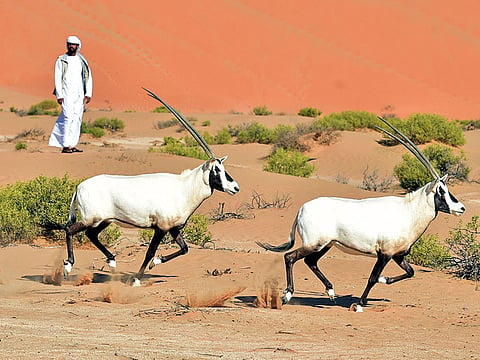Zayed: The man who tamed the desert
While growing up alongside Bedouin tribesmen, Zayed gained a deep understanding of nature

Abu Dhabi: Shaikh Zayed has been described as “the man who tamed the desert”.
His pledge to transform the country into a “green haven” resulted in increased cultivable land by manyfold during his lifetime, a senior official told Gulf News.
“When Shaikh Zayed became president in 1971, the UAE had only 2,530 hectares (6,250 acres) of cultivated land. He allotted funds for vast reclamation projects to increase the agricultural and forested areas. By the early 1990s, the area of cultivated land increased to 470,000 hectares (1,616,370 acres),” said Dr Thani Ahmad Al Zeyoudi, Minister of Climate Change and Environment.
Despite the popular belief that agriculture was not suitable for the UAE due to its very hot climate, tough desert and scarce water resources, Shaikh Zayed was persistent and charted a clear path towards a greener UAE, he said.
“Fifty years ago, no one could believe that it was even possible to transform a barren land into the land of lush greenery we see today. For Shaikh Zayed’s vision, the sky was the limit,” he said.
Agriculture and civilisation
Shaikh Zayed’s steadfast efforts over the years led to the rapid growth of agriculture across all emirates. Agriculture also became one of the pillars of the national economy and a sign of civilisation as reflected in Shaikh Zayed’s famous statement: “Give me agriculture and I will give you civilisation.”
The transformation of vast stretches of barren desert into fields of wheat and orchards, and towns with sandy streets into garden cities is virtually unmatched in human history, Al Zeyoudi said.
Shaikh Zayed was a man of the land and environment all his life. While growing up alongside Bedouin tribesmen, he gained a deep understanding of the land and its people and how people could sustainably interact with their surroundings, the minister said.
He had an innate passion for nature conservation by using only what was needed and saving the rest for future generations
Since the time he became the ruler of Al Ain in 1946, Shaikh Zayed had a vision to transform the formerly dry and rocky area of Al Ain into a lush green land.
To turn his vision into reality, the founding father summoned prominent agricultural experts from around the world and took several measures to promote agriculture.
Modernising irrigation
Some of his first achievements were rebuilding the ancient irrigation system, Falaj, reclaiming new agricultural lands, building conduits, cutting canals, providing free water and expanding the date palm tree plantation, Al Zeyoudi said.
Fifty years ago, no one could believe that it was possible to transform a barren land into the land of lush greenery we see today. For ShaikhZayed’s vision, the sky was the limit.”
These green achievements were made possible with the discovery of new supplies of fresh water.
He renovated and expanded the traditional water resources such as underground aquifers in Al Ain, the covered Falaj channels that conduct water from mountain springs to plains and wells. The watering system was modernised with the wide use of centrifugal pumps and drip-irrigation system. Waste water in the cities was treated and recycled for agricultural use, Al Zeyoudi said.
The greening efforts were complemented by the strictly enforced wildlife conservation. Shaikh Zayed allotted funds to restore endangered species through captive breeding programmes and reintroduced them into well-protected reserves. Al Ain Zoo was part of this initiative.
Shaikh Zayed’s private nature reserve on the Sir Bani Yas Island became a haven of many animal species, including Oryx and Arabian gazelles, Al Zeyoudi said.
The continuous expansion of the nature reserves, creation of artificial lakes and the non-stop greening of the country have turned the UAE into a garden in the desert.
“These are the everlasting gifts presented by Shaikh Zayed to this country,” the minister said.
40m palm trees in UAE: a legacy of Shaikh Zayed
Abu Dhabi: Shaikh Zayed’s efforts were a major contributor to the flourishing date palm cultivation in the UAE, a senior official told Gulf News.
“Today with more than 40 million date palms in the UAE, the country is the leading cultivator of date palm trees in the world. This sector is one of the most vibrant contributors to the economic growth of the UAE,” said Dr Thani Ahmad Al Zeyoudi, Minister of Climate Change and Environment.
Shaikh Zayed paid a lot of attention to the date palm plantation, which helped the fast growth in the number of palm trees as well as the size and variety of dates.
Following his directives, researchers worked hard to explore ways to enhance agricultural productivity and select plants that would survive the harsh environment and not be uprooted by a sandstorm, Al Zeyoudi said.
Mechanical pollination of palm trees and combating palm weevil were areas of intense research. Shaikh Zayed directed to share the research results with farmers to optimise their productivity, the minister said.
Apart from palm trees, Shaikh Zayed succeeded in planting vegetation in large areas of the desert, by levelling dunes. He achieved this by brushing a layer of clay on the land, dividing the area into farms, and encircling them with trees and plants to protect them against the wind.
He then distributed these farms to citizens, gave training to farmers and educated them on ways to minimise water consumption. He also worked on the construction of dams, seawater desalination, and planting mangrove trees.
“The UAE leadership today shares Shaikh Zayed’s passion for agriculture as the national government announced plans to boost agricultural output by 60 per cent by 2051. To achieve this, the leadership relies heavily on innovative, sustainable farming and water-conservation technologies, such as the modern model of greenhouses that uses the hydroponic system,” Al Zeyoudi said.
Sign up for the Daily Briefing
Get the latest news and updates straight to your inbox



